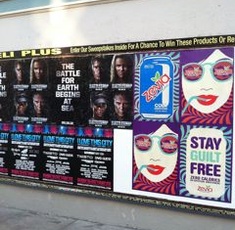On Tuesday, San Francisco Beautiful filed a lawsuit of its own, claiming the city’s recent settlement with the billboard company Fuel Outdoor violates Prop. G and a state environmental law.
Fuel Outdoor had sued San Francisco in federal court after the city issued 84 notices of violation to the firm for violating the billboard ban. The company claimed Prop. G violated its constitutional right to free speech. When a federal appeals court threw out a similar challenge to Los Angeles' billboard ban, Fuel Outdoor began pursuing a settlement agreement with San Francisco.
In February, the city agreed to allow the firm to pay $1.75 million in fines for violating the billboard ban. But Fuel Outdoor has to pay only if the city lets it remove some of its larger billboards and put up 125 smaller signs instead.
“This is a lousy way to enforce laws enacted by our citizens,” said Hanke, who leads San Francisco’s billboard committee. “If you do it for Fuel Outdoor, you have to do it for every scrappy billboard company that can afford to hire a lawyer.”
The San Francisco city attorney’s office refused to comment. But Jim Reuben, Fuel Outdoor’s attorney, said the settlement allows city officials to avoid the difficult task of levying fines against hundreds of small property owners who are responsible for the signs that go up on their buildings. He also said the firm has removed the signs that violated the city ordinance.
In negotiating the settlement, Reuben sought to “get the landlords off the hook, get Fuel into compliance and do something that benefited everybody,” he said. “Sometimes, these things are hard to enforce. They’re easy to pass at the ballot, but hard to comply with.”
A quick tour of the city indicates that compliance remains a problem. For example, at the corner of Ashbury and Hayes streets, two billboards, each the size of cars, covered one wall of Deli Plus market on Monday. The signs advertised Zeva soda, Designer Shoe Warehouse and the I Love This City music festival. The top and bottom of each billboard featured 3-inch-high messages inviting viewers to enter a raffle to “win free stuff.” Deli Plus’ owner told a reporter he was not aware of any raffle associated with his store.
According to Dan Sider, the San Francisco Planning Department advertising specialist, the signs on Deli Plus are illegal. But the owner of those signs and similar billboards throughout the city, Contest Promotions LLC, has claimed that the words “win free stuff” and the raffle that is supposed to be offered inside the deli actually promotes the store’s wares. San Francisco’s billboard ordinance bans only so-called general advertising.
Randal Morrison, a San Diego attorney who advises governments on outdoor sign policies, agreed with Sider. The sign "is a separate business available for rent to anyone who comes to the advertising firm with a check,” Morrison said. “That is in contrast to on-site advertising, which is part of the same business.”
Contest Promotions officials did not return two phone messages requesting comment. Like Fuel Outdoor, Contest Promotions has sued San Francisco, claiming the billboard ban violates its First Amendment rights, while continuing to manage billboards the city deems illegal. The litigation is on hold pending settlement talks with the city.
Morrison noted that the U.S. Supreme Court has upheld San Diego’s billboard ban, the only time the justices considered a First Amendment challenge to such a law. And he pointed out that San Francisco’s ban already has withstood some key legal challenges.
Evan Lee, a constitutional law professor at the UC Hastings College of the Law, added that companies have tried repeatedly – and failed – to limit various types of advertising bans on free-speech grounds.
“If San Francisco wants to ban billboards, it can ban billboards,” Lee said.
While billboard companies continue their legal battles with the city, another public agency, the Transbay Joint Powers Authority, approved a contract with Fuel Outdoor in April to manage billboards at the temporary bus station downtown. According to agency documents, the company was qualified to bid on the contract because it had more than five years' experience managing signs in an urban setting.
“We recognize they weren’t the only company to have challenges under voter-approved Proposition G,” said Adam Alberti, spokesman for the authority, which is overseeing the construction of the new Transbay Transit Center. “We have no opinion about that policy but recognize that the policy had an upsetting effect for the industry.”
This story was produced by The Bay Citizen, a project of the Center for Investigative Reporting. Learn more at www.baycitizen.org.
